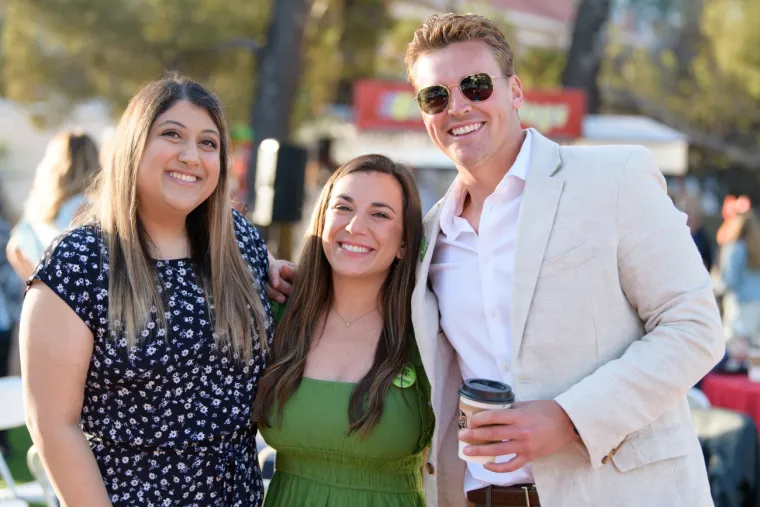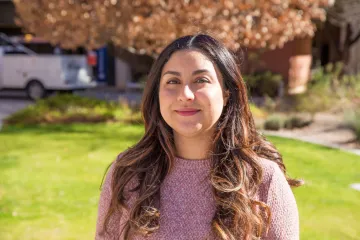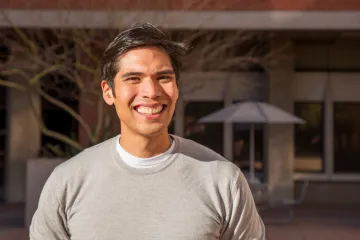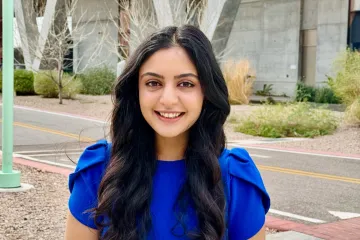Next generation of physicians to gather for Match Day
This Friday, 111 medical students from the College of Medicine – Tucson will learn where they will pursue the next phase of their medical training.

What: Class of 2024 Match Day Ceremony
When: Friday, March 15, 7:30-11:30 a.m.
Where: Outside of Old Main, 1200 E. University Blvd., Tucson
Livestream: https://satyrlivestream.com/stream/matchday2024/
At this year’s Match Day ceremony, to be held Friday, March 15, on the west side of the Old Main Building on the University of Arizona campus, 111 medical students from the University of Arizona College of Medicine – Tucson will learn where they will pursue the next phase of their medical training.
Fourth-year medical students across the country will gather with loved ones and simultaneously open their envelopes at 9 a.m., learning where they will begin their residencies. Varying in length from three to seven years, residencies are the stage of graduate medical education during which new doctors practice medicine in their chosen specialty under the supervision of a senior physician.
After four years of study, volunteering, research, clerkships, sub-internships and clinical rotations, UArizona College of Medicine – Tucson students see Match Day as the first step of their medical careers.
In the final year of medical school, students engage in residency interviews at institutions where they aspire to pursue additional training. Then, students rank their preferences for residency locations, and institutions likewise rank the students they desire to bring on as trainees. The National Residency Matching Program oversees the matching process, concluding with medical students committing to serve in the location where they have been matched.
“Match Day is a momentous occasion that unites the excitement of our medical students with the pride of our administration and faculty. The ceremony symbolizes the culmination of years of dedication, resilience and the development of a professional identity,” said Rich Amini, MD, associate dean for student affairs. “As our students discover their placements for graduate medical education, we take immense gratification in sending forth well-prepared graduates to programs nationwide. We also look forward to welcoming a substantial number into our own residency programs, fostering the next generation of exceptional physicians within our community.”
Registration and breakfast begin at 7:30 a.m., with programming starting at 8:15 a.m. At 9 a.m., students will individually gather with their supporters to open their Match Day envelopes, and at 9:30 a.m., they will announce their matches publicly. Closing remarks begin at 11 a.m.
Parking is available ($8 per car) at the Tyndall Garage, located on Tyndall Avenue south of University Boulevard. There is an accessible drop-off area for people with disabilities on University Boulevard at the flagpole west of Old Main.
For more information, visit the College of Medicine – Tucson Match Day webpage.
College of Medicine – Tucson medical students participating in Match Day include:
Monique Crawford, MSN, MS: ‘Seeing how physicians work together was eye-opening’

Monique Crawford, MSN, MS
Anna C. Christensen
Monique Crawford, MSN, MS, was a nurse for eight years before making the pivot to medicine. Through her work with the Sarver Heart Center’s Structural Heart Disease Program, she observed health professionals collaborating on challenging problems.
“Seeing how physicians work together, combining different specialties to come up with a plan for a high-risk patient, was eye-opening,” she said.
In 2019, Crawford was accepted into the Pre-Medical Admissions Pathway (P-MAP), an intensive preparation program for promising students who have faced considerable obstacles. She earned a master’s degree in cellular and molecular medicine and got a head start on medical school.
“P-MAP provided essential study skills and introduced topics we would later revisit with more depth, while also learning from professors we would see again in medical school,” she said.
As a medical student, she often drew from her previous nursing experience, but knew there was still a lot to learn.
“Medical school was still very humbling,” she said. “I was very comfortable as a nurse, but as a doctor, you take on a different role.”
Crawford has applied to programs in internal medicine with the intention to apply for a fellowship in pulmonary critical care after completing her residency training. She will celebrate Match Day with her family, alongside some of her former nursing colleagues.
Jonathan Credo, PhD: ‘The physician and scientist I want to be’

Jonathan Credo, PhD
Anna C. Christensen
Jonathan Credo, PhD, came of age in Flagstaff, near the Navajo Nation, where he has roots on his mother’s side.
He majored in biochemistry and biomedical sciences at Northern Arizona University, investigating water contaminants on the Navajo Nation, where mining has wreaked havoc.
“It really opened my eyes,” he said. “I would love a career where I work with the community to answer their questions, not only from a clinical perspective, but also a research perspective.”
As an MD/PhD student, he completed a doctorate in clinical translational sciences through his work on environmental exposures in tribal communities across the western U.S. He hopes to match into a combined residency program in internal medicine and psychiatry, believing that physical and mental health can be treated concurrently.
“It’s harder for someone who’s stressed at work to manage their condition, and these conditions spin out of control,” he said. “Diabetes gets worse, hypertension gets worse. Yes, you can treat it strictly medically, but how do you give these patients tools to be more resilient to stressors?”
He’s looking forward to Match Day, which he expects to celebrate with “a nice long run.”
“I love being outside, in nature. Wherever I match, my top programs are places where I have that close connection to nature.”
Priyanka Hadvani, MS: ‘I can’t imagine being anywhere else’

Priyanka Hadvani, MS
courtesy Priyanka Hadvani, MS
Phoenix native Priyanka Hadvani, MS, got her start at the College of Medicine – Tucson a decade ago as an undergraduate in physiology and medical sciences.
“The physiology program solidified my desire to pursue medicine, and was helpful in showing me that medicine was truly what I wanted to do with my life,” she said.
After receiving a master’s degree in biomedical sciences from Marian University, Hadvani was accepted into the Pre-Medical Admissions Pathway, an intensive preparation program for promising students who have faced considerable obstacles. With a head start on medical school, she flew through her first two years, and then began her search for a specialty that felt right.
“Throughout my rotations, I felt like there were some pieces missing. When I started shadowing in anesthesia, all the pieces fit together,” she recalled. “It’s the perfect blend of physiology and hands-on procedures. It’s a privilege to be a calming presence for patients.”
She says her fondest memories here involve the people she met.
“The support from faculty has been monumental in getting me to where I am today. The training we receive prepared me for the next challenge,” she said. “The people have made the place home for me. I can’t imagine being anywhere else.”
Maya Lowney: ‘I like to know as much as I can’

Maya Lowney
Anna C. Christensen
Maya Lowney’s passion for medicine originated in childhood, when her little sister was born with a disability.
“We had to fly her all the way from Hawaii to the Mayo Clinic in Rochester just for her diagnosis,” she recalled. “She needed open heart surgery as a baby and spent six months in the hospital on Oahu, away from the family. Ultimately, we had to relocate to the mainland.”
After her family moved to Sedona, Lowney enrolled as an undergraduate at the College of Medicine – Tucson, majoring in physiology and medical sciences with honors. With minors in dance and anthropological medical studies, she united these interests in her senior thesis, examining the impact of dance on Parkinson’s disease progression.
She considered other health care professions, but realized medical school was the right choice.
“I’m very thorough and like to know as much as I can,” Lowney said. “I wanted to be sure my patients would receive the best care possible. For me, that meant I needed to obtain the most education I could.”
She hopes to match to a residency in general surgery.
“General surgery opens a lot of doors for specialties,” she said. “I would also have the opportunity to stick with general surgery and work in a rural area, which I’m passionate about.”

